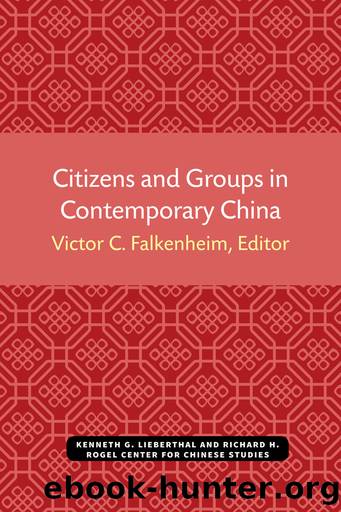Citizens and Groups in Contemporary China by Victor C. Falkenheim

Author:Victor C. Falkenheim
Language: eng
Format: epub
Publisher: Kenneth G. Lieberthal and Richard H. Rogel Center for Chinese Studies
Published: 2020-02-15T00:00:00+00:00
Conclusion
The patterns of political participation by Chinese scientists over the history of the PRC reveal some features that are consonant with our understanding of participation by scientists elsewhere. Others are of significance mainly in the context of Chinese experience; among these the perennial uncertainty of the political standing of scientists stands out. Scientists have not been able to influence this fundamental feature of their condition in any significant way, although there are some indications of successes in the early 1970s among elite scientists working with the political elite.
When the regime has sought to reaffirm the political rights of scientists, it has done so in part to solicit the contributions of the scientific community to national development efforts. That is, it has intended to encourage what Hirshman has referred to as âvoice.â At such times, scientists have had concerns about both collective and divisible goods. The former category has included the organizational arrangements for Chinese science and living and working conditions, conditions which in part are a function of how the underlying issue of political standing is resolved. We saw that in the 1950s collective goods could not be pursued without introducing distributive issues involving divisible goods. Once these issues appeared, cleavages within the scientific community were revealed which suggested that Chinese scientists lacked the cohesion of interests which would justify our regarding them as an identifiable interest group. The ability of the scientific community to achieve a workable sense of collective identity has been limited by uncertainties about political rights and the penetration of science by state and party organizations which turns issues of common concern to scientists into âspecial interestâ issues of distribution.
On the other hand, in the post-Mao period the concern for improved working and living conditions has been articulated effectively by CAST. Under current policies, CAST has been able to act more like an associational interest group on issues of common concern than had previously been the case. The common interests of the technical community also find expression in the network of policy analysis that has arisen in recent years, and in providing the scientific advice that is now actively sought. Those setting the agenda for policy in technical areas have also become more sympathetic to science and technology.
However, the interests scientists deem worth pursuing are by no means limited to common concerns for the provision of collective goods. One suspects that as the new political standing of scientists comes to be accepted, the collective lot of the technical community will improve, and therefore will become less of an issue. Indeed, one would expect that the pursuit of interests will increasingly involve divisible goods and their distribution.
As in the pre-Cultural Revolution period, the pursuit of special interests may be through professional structures or through state agencies. The type of science, and particularly its artifactual requirements, is important in determining the type of strategy followed. The pursuit of interests through the state structure is illustrated by the case of a CAS physics institute which sought to procure an expensive piece of equipment and new facilities.
Download
This site does not store any files on its server. We only index and link to content provided by other sites. Please contact the content providers to delete copyright contents if any and email us, we'll remove relevant links or contents immediately.
| Elections & Political Process | Ideologies & Doctrines |
| International & World Politics | Political Science |
| Public Affairs & Policy | Specific Topics |
| United States |
The Secret History by Donna Tartt(18994)
The Social Justice Warrior Handbook by Lisa De Pasquale(12175)
Thirteen Reasons Why by Jay Asher(8870)
This Is How You Lose Her by Junot Diaz(6854)
Weapons of Math Destruction by Cathy O'Neil(6245)
Zero to One by Peter Thiel(5760)
Beartown by Fredrik Backman(5706)
The Myth of the Strong Leader by Archie Brown(5479)
The Fire Next Time by James Baldwin(5408)
How Democracies Die by Steven Levitsky & Daniel Ziblatt(5197)
Promise Me, Dad by Joe Biden(5127)
Stone's Rules by Roger Stone(5065)
A Higher Loyalty: Truth, Lies, and Leadership by James Comey(4937)
100 Deadly Skills by Clint Emerson(4898)
Rise and Kill First by Ronen Bergman(4757)
Secrecy World by Jake Bernstein(4724)
The David Icke Guide to the Global Conspiracy (and how to end it) by David Icke(4679)
The Farm by Tom Rob Smith(4484)
The Doomsday Machine by Daniel Ellsberg(4472)
